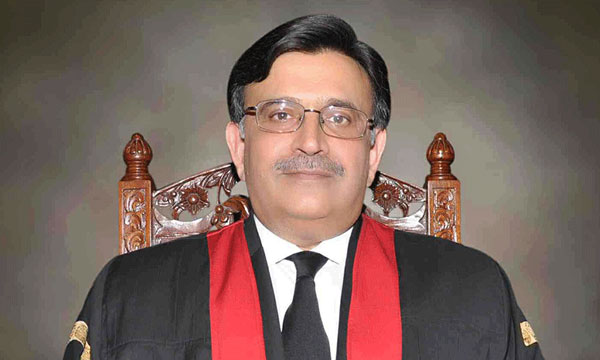Says fight assembly’s war in assembly; SC wants to protect everybody’s voting rights
Chief Justice of Pakistan Umar Ata Bandial on Monday observed that there should not be any interference to halt the process of Article 95 of the Constitution which permits a no-confidence motion against the incumbent prime minister.
The two-member bench that also includes Justice Munib Akhtar made these remarks while hearing a petition of the Supreme Court Bar Association that sought the intervention of the apex court to prevent “anarchy” on the day of the no-trust vote.
The Chief Justice said the assembly’s “wars” should be fought in the assembly as the Supreme Court heard a case related to public gatherings of the Opposition and the government in the federal capital — ahead of the no-confidence motion against Prime Minister Imran Khan.
Three bigwigs of the Opposition including PML-N President Shahbaz Sharif, PPP Chairman Bilawal Bhutto Zardari and JUI-F chief Maulana Fazlur Rehman, along with other opposition leaders, were present during the hearing.
At the outset of the hearing, the lawyer representing SCBA said that the NA Speaker has summoned the assembly session on March 25 while it has to be convened within 14 days of the submission of the no-trust motion under Article 95.
“The court is not convinced on interfering in the NA’s affairs. It only wants that no one’s right to vote is affected,” CJP Bandial remarked during the hearing.
Listening to the arguments by the SCBA counsel regarding the delay in the voting on the no-confidence motion, which was filed on March 8, the CJP said that “these are the internal matters of the assembly,” adding that it would be better to fight these battles inside the assembly. The petitioner’s lawyer highlighted that under Article 95, the speaker of the National Assembly has to summon a session within 14 days from the time when the no-confidence motion is filed.
Regarding the voting on the no-confidence motion, CJP Bandial said that the SCBA wants the lawmakers to have the choice to vote for whomever they want.
However, he said, the question is whether the personal choice of an MNA can differ from the party policy. The SCBA’s lawyer argued that all the MNAs should have the right to vote freely. At this, Justice Muneeb Akhtar inquired about the article under which lawmakers can vote freely.
Responding to the query, the SCBA’s lawyer said that the MNAs elect the speaker and other officials of the assembly under Article 91.“If someone is casting his/her vote how can someone say that it is not their right to vote,” Justice Akhtar said, asking the SCBA on which article the body has based its case.
“All of this is the assembly’s internal matter and it will be better that it is settled in the assembly. We do not want to go into details of this matter,” the CJP said as the SCBA sought to stop the gatherings.
CJP Bandial, asking the political parties what did they want the court to do in this matter, noted that the judiciary could only play a mediator’s role in political matters for the betterment of democracy.
The court stated that party workers cannot be brought to the capital to stop lawmakers from casting their vote during the session on the no-confidence motion. “Sit together and form a consensus […] choose a place other than D-Chowk,” the CJP advised the political parties.
Regarding the Sindh House incident, the IG Islamabad Police told the court that the JUI-F workers also tried to go towards the Sindh House, however, they were stopped near Balochistan House. “We are ashamed over the incident,” he added. Talking about the incident, Attorney General Khalid Javed Khan said that orders have been issued to the police and authorities concerned to investigate the matter.










